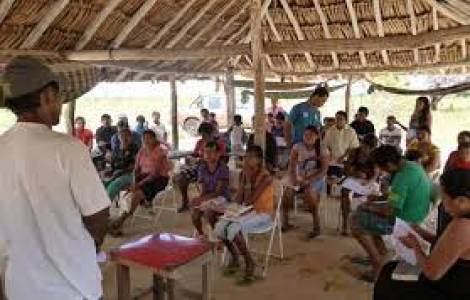
Brasilia (Agenzia Fides) - "May the institution of the ministry of the catechist be, for the Church, a further reason for unity and communion, in the diversity of gifts and ministries that are at the service of the ecclesial community, for its maturation and growth": this is stated in the Document just published by the Brazilian Church which indicates "criteria and itineraries for the institution of the ministry of the catechist". The Biblical-Catechetical Animation Commission of the National Conference of Bishops of Brazil (CNBB), following the indications of Pope Francis in the Apostolic Letter Antiquum ministeriun, which institutes this ministry and assigns to the Episcopal Conferences the task of indicating the criteria and the formative itinerary, has prepared this Document that presents considerations and criteria that must be put into practice in the local Churches of Brazil.
The institution of a service as a "ministry" by the Church is an action that highlights its importance, points out the CNBB. The institution of the ministry of the catechist is the confirmation of the recognition of the mission of the "missionary disciple", who joyfully responds to the Lord's call to announce and bear witness with his life to his great love. The Commission reiterates that the possibility of being instituted a catechist means allowing everyone to confirm their yes to an important service, which requires a lot of dedication and effort, to bear witness to faith, hope and love with their lives.
The document was discussed and approved during the last Plenary Assembly of the CNBB. On the occasion, the Bishops highlighted that catechists in Brazil work together with ordained ministers, offering an excellent contribution to the path of initiation into the Christian life. "Catechists are the great collaborators in the construction of human life and of our communities", underlined Msgr. Waldemar Passini Dalbello, Bishop of Luziânia and member of the CNBB Biblical-Catechetical Animation Commission. The period of discernment will offer a human, community, spiritual, doctrinal, theological and pastoral-missionary formation, so that the candidates for the ministry can responsibly assume the mission that God wants to entrust to them. In Brazilian dioceses, formation can take place, depending on the situation, in diocesan schools for catechists, making use of Catholic institutes and faculties.
The Argentine bishops have also published a document on the lay ministry of the catechist, which "now must be vitally updated in each of our ecclesial communities - writes in his presentation Msgr. Gabriel Mestre, Bishop of Mar del Plata and president of the Episcopal Commission for Catechesis and Biblical Animation. In our particular Churches it must be configured creatively and at the constant service of the renewal of catechesis". In the Letter of the directors and members of the diocesan Commissions of Catechesis addressed to all the catechists of the country, which is reported in the document, it is recalled that the Church "looks with deep respect and gratitude at everything we do, and in this historic moment offers us the ministry of the catechist as a gift and a service to which we are all called”. Inviting us to welcome this gift with joy, to strengthen prayer and discernment, the Letter continues: "Our country seeks your conciliatory and fraternal testimony to embark on paths of dialogue among brothers ... We urge you to renew the path of formation in which dimensions of being, of knowing, of knowing how to do and of knowing how to be with others, strengthen the missionary perspective that must characterize our role in the community”.
For this reason, the document is divided into two parts: the first presents the normative criteria for vocational discernment (ecclesiality, ministerial vocation, stability, secularity, human and faith maturity, integral formation) with some references to the Argentine reality. The second part focuses on the formative itinerary, which includes several interconnected dimensions: development of human and Christian maturity with a missionary awareness, acquisition of biblical-theological knowledge, knowledge of the person and of the social context, pedagogical and methodological formation.
"It is vital that throughout the formation process the centrality of the spiritual experience is breathed in a missionary perspective," the text underlines. The itinerary is divided into three stages: call, knowledge and integral following of Jesus, sent by the Spirit. (SL) (Agenzia Fides, 17/12/2022)